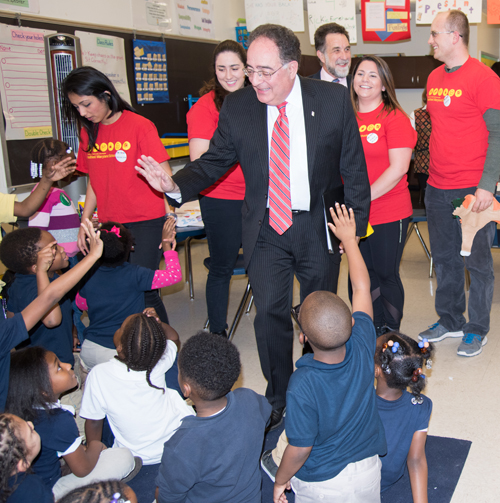Do School Wellness Efforts Help Kids? Study Underway
The University of Maryland School of Medicine (UMSOM) has been awarded a nearly $5 million grant from the U.S. Department of Agriculture (USDA) to promote health and wellness in Baltimore City and Maryland schools.
“Obesity takes a toll on all of a child’s body systems, from the bones to the digestive tract to the issue of asthma, but it also takes a very important toll on their self-confidence, on their motivation, on their happiness, and therefore on their education,” said University of Maryland, Baltimore (UMB) President Jay A. Perman, MD, speaking at a Dec. 7 news conference at Furman L. Templeton Preparatory Academy.
By federal mandate, all public school systems must have wellness policies specifying what schools should do to promote healthy eating and physical activity. Research conducted under the five-year USDA grant will examine whether such wellness policies have an impact on students’ health and behavior.
Under the grant, a new project called Wellness Champions for Change will train students and teachers to become “wellness champions” in schools to implement the wellness policies and create a health promoting environment, explained Erin Hager, PhD, associate professor at UMSOM, who will lead the research team.

UMB President Jay A. Perman, MD, greets kindergartners participating in an after-school wellness program at Furman L. Templeton Preparatory Academy. Students from UMB (shown in red shirts) have been trained as "health leaders" to teach the children about the importance of healthy eating and physical exercise. School of Social Work Dean Richard P. Barth, PhD, MSW, also observed the class activity.
Wellness Champions for Change brings together teams of teachers, administrators, staff, and parents to carry out the wellness policy, and to empower students to advocate for a health promoting school environment and encourage their peers to make healthy choices.
During the course of five years, the research team will evaluate three groups of students: those in schools without any programming, those in schools with programming to build teacher-led wellness teams, and those in schools with programming to build student- and teacher-led wellness teams. Data collected will include students’ weight, body composition, diet, and physical activity.
Perman, a pediatric gastroenterologist, noted that when he was hired as University president in 2010, the Board of Regents of the University System of Maryland asked him what were the important things he wanted the University to address. His response was childhood obesity. A year later, he convened the “Summit on Childhood Obesity,” which drew leaders from across the state.
“And then what?” Perman asked the audience of educators and local and state officials. “So you are helping me to keep a promise [to the Board of Regents] and I appreciate that.”
Currently, six Baltimore schools, including Furman L. Templeton Preparatory Academy, participate in a program in which students from UMB’s professional schools are trained to become “health leaders” and teach kindergartners about physical activity and nutrition in an after-school program.
“Here at Furman we believe that we have to educate the whole child,” said Rosalind Lockwood, the school’s executive director. “And that means, we’re just not focusing on reading, writing and arithmetic. In order to do that, we really have to consider looking at things outside of what’s happening in the classroom.”
E. Albert Reece, MD, PhD, MBA, dean of UMSOM and UMB's vice president for medical affairs who served as master of ceremonies, noted that research is one of the School of Medicine’s missions and is conducted on four continents and in 35 countries. “But it’s also done right here. Right here in our backyards,” he said. “We put a lot of emphasis on what happens here at home.”
Steven Czinn, MD, chair of UMSOM’s Department of Pediatrics, noted that the department operates satellite offices throughout the state in an effort to bring physicians closer to families.
“But I can tell you as a pediatrician, but more so as a parent of four kids, I know how difficult it is to juggle children, work, transportation, child care to try to make an appointment. So it’s not surprising that we are not touching nearly as many children or families that we need to,” he said. “We have to change how we provide health care and if children are going to spend many many hours, much of the day in school, we need to go where the kids are. We need to partner with the schools, with the educators, and that’s exactly what you’re doing with this program.“
Greg Sileo, MPP, assistant commissioner of chronic disease prevention at the Baltimore City Health Department, added “There’s no better place to instill the importance of healthy eating and exercise than right here, in these schools. … We need programs like this to create a culture of health among our young people.”



